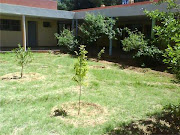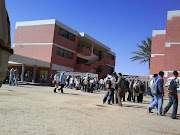Saturday, March 15, 2008
Thursday, March 6, 2008
Friday, February 29, 2008
Sunday, January 20, 2008
PAST PERFECT TENSE
For example,
- When I woke up this morning, my roommate had already left.
After I had eaten my dinner, I went to see a movie.
Before I arrived at the theater, the movie had already begun.
- After I had gone shopping, I stopped at the health spa.
After I went shopping, I stopped at the health spa.
| When I was young, I had been a cowboy. When I was young, I was a cowboy. | (Incorrect: no reference to other events) (Correct) |
| Yesterday the Johnsons had opened their new business. Yesterday the Johnsons opened their new business. | (Incorrect) (Correct) |

Click here for audio

Thursday, January 17, 2008
Monday, January 14, 2008
Making a request
AA: I'm Avi Arditti with Rosanne Skirble, and this week on Wordmaster -- how to make a request, as in, "Could you help us out?"
RS: That's what we asked our friend Lida Baker. She teaches in the American Language Center at the University of California at Los Angeles, and she writes textbooks for English learners.
AA: We'll start with the simplest form of request, the imperative form: "Close the door." "Sit down." "Read this." Beware, though: Unless you're saying this in a friendly way to someone you feel comfortable with, you could offend people. That's because it sounds more like an order than a request.
BAKER: "Most Americans, I think, would agree that the imperative form is a little bit too direct."
RS: "It doesn't give you a sense of security or politeness."
BAKER: "Right. So what we do is that we can take that imperative form and we can add words and phrases that we call softeners. So 'close the door doesn't sound very polite, but as soon as we say 'please close the door' it becomes a lot more acceptable."
RS: Now if that's not polite enough, Lida Baker says, you can take it a step further.
BAKER: "Would you mind closing the door' or 'would you mind telling me where the cafeteria is?' So we also use the form 'would you mind' followed by the -ing form if we're trying to be very polite.
"Now an interesting thing about requests is if we think that we're asking for something that's an imposition on the other person, or if the other person has a lot more authority than we have, then we might tend to make the request longer and we would add these softeners at the beginning that are kind of a combination of the things that we have already talked about.
"So we start with 'close the door.' We add 'please close the door,' and to make it softer, we could say, 'Could you please close the door,' and to make it even softer, we could say, 'Could I ask you to please close the door?'"
AA: Lida Baker says you'll never offend anybody if you begin a request with a phrase like "could you" or "would you," as in, "Would you mind closing the door?"
BAKER: "By the way there's something interesting about the form 'would you mind closing the door.' How do you answer that?"
AA: "Yes, I mind. (laughter)"
RS: "You don't answer that. You just say yes."
AA: "It's rhetorical."
BAKER: "OK, if I say to you, 'would you mind lending me your English book?'"
RS: "I might say 'no problem.'"
BAKER: "That's right. You don't say 'yes' or ‘no.’ You say 'no problem' or you say 'sure.' But what does it mean if you say 'no'?"
RS: "No, I wouldn't mind lending you (the) book' -- which means yes! (laughter)"
BAKER: "That's right. It's funny with this expression 'would you mind,' that 'no' means 'yes.' 'No, I wouldn't mind' means 'yes, I'm going to lend you my book.'"
RS: "You know, the problem here is the question is not a yes or a no question, so you can't answer it with a yes or a no."
BAKER: "That's exactly right. If they agree to do what you want, they'll say 'sure' or no problem and if they're not able to do the thing that you're asking them to do, they'll say something like 'sorry' and then they'll give you an excuse. So if you say 'would you mind lending me your English book tonight,' they'll say, sorry, I can't. I need it.'
"Here's another one that we haven't mentioned before, if you REALLY want to be polite, you could say to somebody: 'I hope I'm not imposing, but could you please lend me your English book."
AA: "But you would reserve that for a situation where you're really asking for an imposition."
BAKER: "You suspect that what you're asking for is asking the person to go out of their way for you."
AA: Lida Baker -- whose books are available through the McGraw-Hill Publishing Company -- cannot reply to messages personally. But she does go out of her way to answer questions on the air, so keep sending them in!
RS: Our postal address is VOA Wordmaster, Washington DC 20237 USA. E-mail is word@voanews.com. And our Web site is voanews.com/wordmaster. With Avi Arditti, I'm Rosanne Skirble.
MUSIC: "Could You Use Me" [from George and Ira Gershwin's Great Depression-era Broadway show "Girl Crazy"]
Friday, January 11, 2008

Globalization is a process of interaction and integration among the people, companies, and governments of different nations, a process driven by international trade and investment and aided by information technology. This process has effects on the environment, on culture, on political systems, on economic development and prosperity, and on human physical well-being in societies around the world.
Globalization is not new, though. For thousands of years, people—and, later, corporations—have been buying from and selling to each other in lands at great distances, such as through the famed Silk Road across Central Asia that connected China and Europe during the Middle Ages. Likewise, for centuries, people and corporations have invested in enterprises in other countries. In fact, many of the features of the current wave of globalization are similar to those prevailing before the outbreak of the First World War in 1914.................
click here to read more
Monday, January 7, 2008
Friday, January 4, 2008
Saturday, December 15, 2007
Friday, December 14, 2007
Thursday, December 13, 2007
Sunday, December 9, 2007
What is Culture?
Other Definitions of Culture Banks, J.A., Banks, & McGee, C. A. (1989). Multicultural education. Needham Heights, MA: Allyn & Bacon.
Damen, L. (1987). Culture Learning: The Fifth Dimension on the Language Classroom. Reading, MA: Addison-Wesley.
Hofstede, G. (1984). National cultures and corporate cultures. In L.A. Samovar & R.E. Porter (Eds.), Communication Between Cultures. Belmont, CA: Wadsworth.
Kluckhohn, C., & Kelly, W.H. (1945). The concept of culture. In R. Linton (Ed.). The Science of Man in the World Culture. New York. (pp. 78-105).
Kroeber, A.L., & Kluckhohn, C. (1952). Culture: A critical review of concepts and definitions. Harvard University Peabody Museum of American Archeology and Ethnology Papers 47.
Lederach, J.P. (1995). Preparing for peace: Conflict transformation across cultures. Syracuse, NY: Syracuse University Press.
Linton, R. (1945). The Cultural Background of Personality. New York.
Parson, T. (1949). Essays in Sociological Theory. Glencoe.
Useem, J., & Useem, R. . Human Organizations, 22(3).
| ||
| | ||


.jpg)
.jpg)

.jpg)
.jpg)






